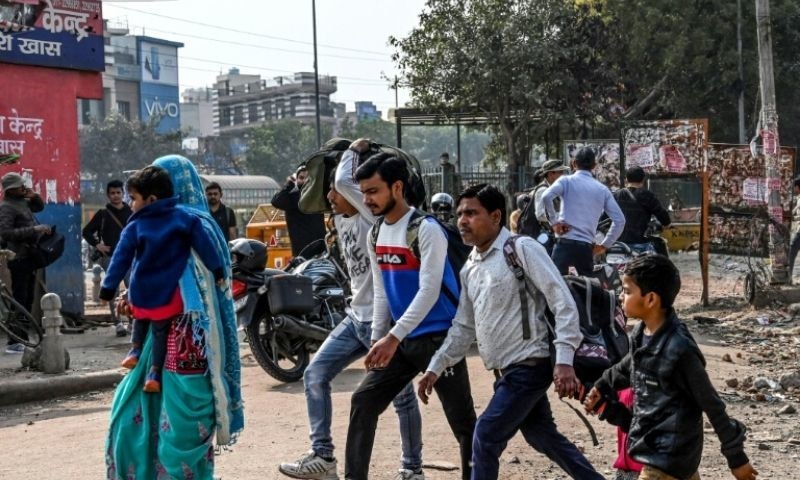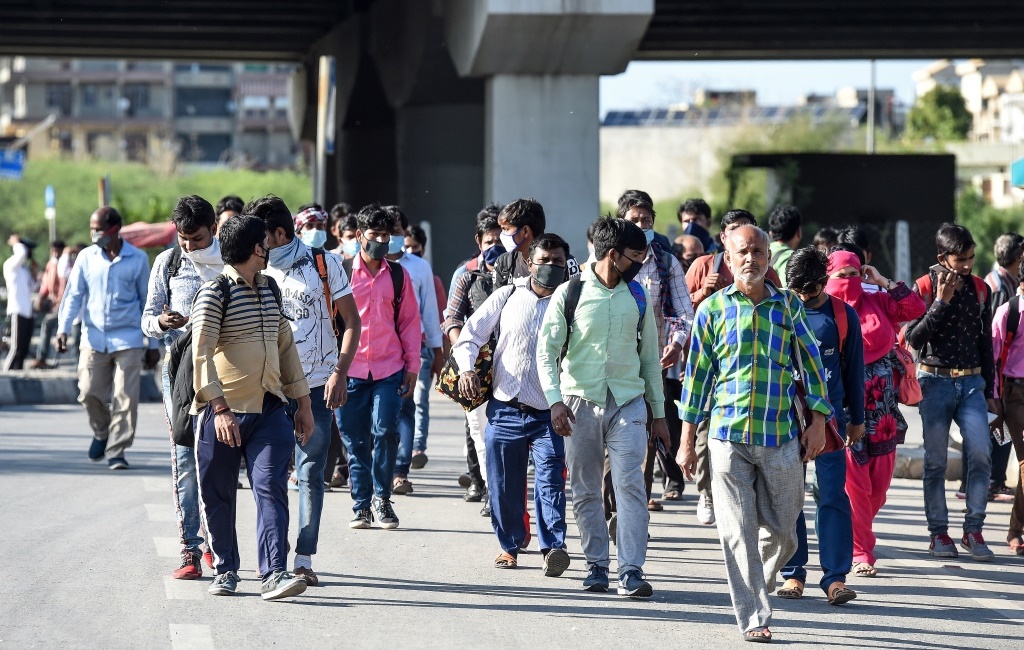India: World’s biggest lockdown forced migrants to walk hundreds of miles home
 NEW DELHI : Thousands are walking long distances back to their home villages after all transport was stopped except for essential services as authorities struggle to contain the outbreak, which has infected more than 700 people.
NEW DELHI : Thousands are walking long distances back to their home villages after all transport was stopped except for essential services as authorities struggle to contain the outbreak, which has infected more than 700 people.
The migrant labourers have been started to move back to their native places, sometimes hundreds of kilometres away from their place of work, negating the entire purpose behind the lockdown announced on March 24, 2020, by Prime Minister Narendra Modi.
Over the last three days, thousands of poor and migrant labourers, as well as semi-skilled workers, were seen crossing the Delhi border on National Highway 24 along with their families on foot in order to get back to their native place mostly in Uttar Pradesh and Bihar.
Similar scenes have been witnessed in places like Mumbai, Hyderabadrabad, Punjab, big cities where the poor are moving back to their native place, increasing the chances of community spread of the deadly coronavirus as such large groups had no concept of social distancing.

There are usually around 100 million unskilled or semi-skilled migrant workers in India, according to a government survey for 2016-17 — around a fifth of the country’s workforce. A lack of jobs, particularly in poor states such as Bihar and Uttar Pradesh, MP places to head to major cities and wealthier southern states.
Since many are unregistered, it is unclear how many have now travelled home and how many are on the road, but media reports suggest there are tens of thousands on the move. Union government thursday a $23 billion welfare package to help its poorest citizens with direct cash transfers and food subsidies that extends to migrant workers.
The chief minister of the eastern state of Bihar, home to many migrant labourers, has said his government will set up relief camps where he insists “social distancing” will be implemented.India has begun a 21-day nationwide lockdown — the biggest in the world — in a desperate bid to stop the coronavirus from spreading out of control in this densely populated nation of 1.3 billion people.
There are more than 700 confirmed cases in India, a number that is rising rapidly. Nonessential businesses are shut, state borders are closed to regular traffic, and people have been asked to stay in their homes except to buy food or medicine.
Uttar Pradesh roadways buses were seen plying for Lucknow carrying a large number of people from Lalkuan, Ghaziabad on Saturday. The bus conductors said that even after instructing people to maintain distance while travelling, no one was not ready to listen as all of them are is in a hurry to leave for their native place.
Thousands are walking long distances back to their home villages after all transport was stopped except for essential services as authorities struggle to contain the outbreak, which has infected more than 700 people.
The migrant labourers have been started to move back to their native places, sometimes hundreds of kilometres away from their place of work, negating the entire purpose behind the lockdown announced on March 24, 2020, by Prime Minister Narendra Modi.
Over the last two-three days, thousands of poor and migrant labourers, as well as semi-skilled workers, were seen crossing the Delhi border on National Highway 24 along with their families on foot in order to get back to their native place mostly in Uttar Pradesh and Bihar.
Similar scenes have been witnessed in places like Mumbai, Hyderabad, Punjab, big cities where the poor are moving back to their native place, increasing the chances of community spread of the deadly coronavirus as such large groups had no concept of social distancing.
Huge numbers had crammed onto trains and buses before the country of 1.3 billion people ground to a halt for three weeks, but many others were left stranded They are trying to get home any way they can, often on foot, with little money or food, and eateries and guesthouses closed along the way.
There are usually around 100 million unskilled or semi-skilled migrant workers in India, according to a government survey for 2016-17 — around a fifth of the country’s workforce. A lack of jobs, particularly in poor states such as Bihar and Uttar Pradesh, forces them to head to major cities and wealthier southern states.
The chief minister of the eastern state of Bihar, home to many migrant labourers, has said his government will set up relief camps where he insists “social distancing” will be implemented.
India has begun a 21-day nationwide lockdown — the biggest in the world. There are more than 700 confirmed cases in India, a number that is rising rapidly.
Nonessential businesses are shut, state borders are closed to regular traffic, and people have been asked to stay in their homes except to buy food or medicine. Migrants gather in large number near Delhi-UP border NH24 amid lockdown in the country
They also pointed that without any income and almost no saving, they cannot afford to live in cities and were facing difficulties in buying food items.
In light of the massive exodus, the Union Home Ministry on Friday issued an advisory asking the state governments to prevent the mass reverse migration of labourers, industrial workers and unorganized sector employees from their workplaces to hometowns.
The alarming situation comes even after Delhi CM Arvind Kejriwal on Friday announced that the migrants living in Delhi are the state government’s responsibility. He also declared that more than 4 lakh people will be provided food on a daily basis.
(With Agency Inputs ).

